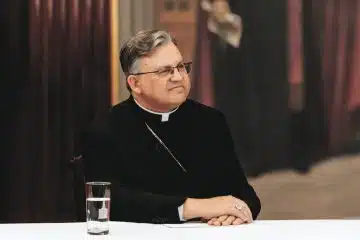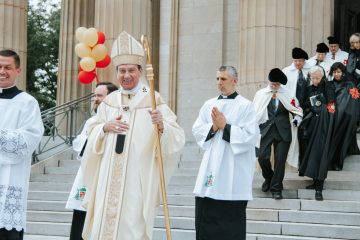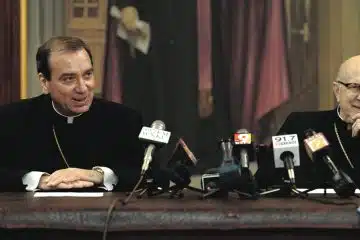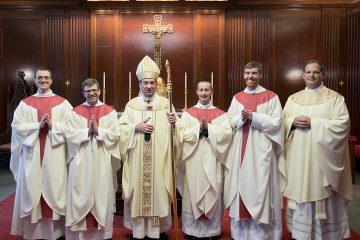Ghanaian cardinal speaks at University of Dayton
June 19, 2012
By Steve Trosley
DAYTON — Launching a “Vatican document to make Socrates proud,” Cardinal Peter Turkson of Ghana keynoted the eighth annual International Conference on Catholic Social Thought at the University of Dayton Monday.
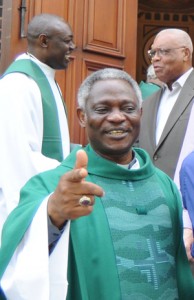
The cardinal opened the conference with a Mass at Immaculate Conception Chapel before giving the keynote address at a lunch in Kennedy Union. The document, “Vocation of the Business Leader, A Reflection,” was born of a seminar, “Caritas in Veritae” held at the Pontifical Council for Justice and Peace, which Cardinal Turkson chairs.
Cardinal Turkson’s speech focused on what Catholic business education should comprise; the character of Catholic institutions of business education and also some future possibilities.
“Engagement in business, or entrepreneurship, is primarily a vocation,” Cardinal Turkson said, “and, therefore, it involves a free assumption of responsibility in solidarity on the part of everyone involved.”
Elaborating on “foundations,” and the purpose of business sin the context of Catholic social teaching, Cardinal Turkson said, “engaging in business is a noble vocation.”
The cardinal also explained proper conduct in business and how business schools could cultivate that discernment in their students and he discussed the need for balance in life for those in the business vocation:
”Time for family and friends and also for oneself; time for recreation and relaxation; time for spiritual and physical exercise; and time for an active parish life and volunteer service — it is in the balance of these aspects that we find meaning and joy,” the cardinal said.
In discussing the role of business schools in developing the business vocation, Cardinal Turkson called upon “Catholic business professionals and educators and scholars to discern and prophesy in your areas of competence. Use Catholic social doctrine as your lens for seeing. Use Catholic tradition as your criteria for judging. Follow the ancient Catholic tradition of applying faith and reason in your quest.”
For future endeavors, Cardinal Turkson recommended studies that further Catholic thought relevant to business developing a “theology of work based on theology of the body; research that shows moral business is good business and an elaboration of sound spirituality of work and of entrepreneurship.”
Cardinal Turkson concluded that in lieu of providing students with an ethics class, ethical teaching should be integrated throughout the curriculum.
During a question and answer period that followed his address, Cardinal Turkson was asked about what one audience member called a “monumental undertaking,” that of developing a global financial authority. The statement had generated considerable controversy. The cardinal explained with a smile that the so-called proposal was an academic question presented by his group at a G-20 meeting in France.
“Since it is obvious no single nation has a solution for the current financial crisis, and since the United Nations was discussing reform at the same time, we thought it was a good time to ask the question,” Cardinal Turkson explained. “We were not setting out to establish a global authority: we simply felt the time was right to ask the question and see what developed.”





